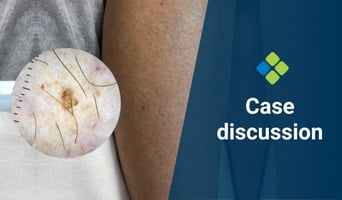In this webinar and Q&A, solicitor and former regulator David Gardner provides exclusive insights...

Achieve accomplished knowledge in the prevention, treatment and ongoing management of common chronic illnesses.

In this online course, you will gain a comprehensive understanding of the management of thyroid conditions, asthma, childhood chronic illness, osteoporosis, atrial fibrillation, and more, to support your patients and reduce the impact of comorbidities.
- Acquire near-expert knowledge on how to provide early primary care intervention to optimise patient outcomes for those with (or at risk of) chronic health conditions.
- This course is for medical doctors, International Medical Graduates, registered nurses, and degree-qualified health professionals.
- CPD-accredited and university-reviewed.
- Study medically unexplained symptoms and focus on clinical cases, including long-term conditions in children’s health.
- Provide immediate chronic health management and help to prevent and address comorbidities.
- With an estimated $38 billion per year spent on care for people with chronic health conditions, learn to optimise patient outcomes with early primary care intervention.
- Help reduce the burden of chronic disease, which is the underlying cause of 90 per cent of deaths in Australia and affect about 58 per cent of all presenting patients.
Get unlimited access to all course content, additional learning materials, ongoing post-course support, and more.
This module begins with the anatomy, role and function of the thyroid gland and outlines common conditions. Primary and secondary hypo and hyperthyroidism are discussed including risk factors, primary causes, symptoms, examinations, investigations, diagnosis, management and complications if untreated. The main types of thyroid cancer are outlined including papillary, follicular, medullary, anaplastic and hurtle cell carcinoma. Risk factors, symptoms, signs, diagnosis, investigations and management are discussed. Three patient cases outline different clinical presentations and guides the practitioner through each case. Steps include patient history and medications then discusses examinations, investigations, results, whether to scan, management and follow-up. Treatment and monitoring thyroid conditions are long term, even lifelong.
This module commences with the description and epidemiology of asthma. The history, pathogenesis and a range of risk factors are outlined. An overview of the diagnosis and evaluation of patients with asthma also includes mimics of asthma symptoms. Diagnosis and management for adolescents and adults including diagnostic tools are outlined then moves to the diagnosis, diagnostic tools and management of asthma in infants and children. Red flags to look for are described. The module concludes with information on thunderstorm asthma, asthma emergencies, acute asthma in primary care, vaccination and lists available asthma resources.
Arthritis is an umbrella term for over 100 diseases and conditions affecting the bones, muscles and joints. More than 30 of these are inflammatory rheumatic diseases. The steps of early assessment and diagnosis are outlined commencing with symptoms, patient history and test options. This information is supported by two clinical cases. The first case considers septic arthritis and the second case discusses polymyalgia rheumatica. Inflammatory arthritis aetiologies are outlined before discussing gout and pseudogout in detail.
The module then considers rheumatoid arthritis covering the facts, aetology, history, stages, tests, clinical features and extra-articular manifestations. A case study is included. Pharmacotherapy, DMARDS, non-pharmacological options and complications are outlined. Information is provided on Rheumatoid arthritis (RA) and pregnancy, and RA and vaccination.
Unit five discusses ankylosing spondylitis and psoriatic arthritis in detail including aetiology, symptoms, investigations, tests to assist with diagnosis, differential diagnoses and management information.
This module focuses on the papulosquamous disorders of psoriasis, lichen planus and pityriasis rosea. The first section of the module focuses on identifying the different types of psoriasis and their distinguishing features. It also explains the nine categories of psoriasis, steps taken to make a diagnosis and outlines treatment options. The next topic focuses on recognising the different variations of lichen planus and pityriasis rosea. It explains the six Ps and skin variants of lichen planus, including selecting appropriate treatment options. The diagnosis, including when to biopsy, and the management of pityriasis rosea is outlined including treatment options. Clinical images are featured throughout the module.
This module commences by describing osteoporosis and related statistics. Bone physiology and determinants of bone density are revisited and modifiable risk factors outlined. Fracture risk factors independent of Bone mineral density (BMD) are outlined and two calculators for assessing fracture risk are included. Recommendations for identifying patients to investigate for osteoporosis and bone mineral density testing are outlined. The management of osteoporosis is discussed from a non-pharmacological, lifestyle and pharmacological perspective. The module then discusses osteoporosis in men including risk factors. The module concludes with focussing on osteoporosis in young people including chronic diseases associated with lowered BMD, assessment and the principles of treatment of osteoporosis in children and adolescents.
The primary burden of disease in children and young people has shifted from infectious diseases to chronic conditions. Definitions, demographic and incident data are discussed. Tooth decay is very common in children and information is provided for the medical practitioner encountering this issue. Primary, secondary and tertiary stages of care are listed. The GP role is to listen, support, diagnosis, communicate/educate, coordinate and advocate for the patient and their family. The role of allied health support for the clinician is recognised and discussed. Key consultation strategies and considerations are covered. These include aims, communication, curve balls, breaking bad news, family considerations, non-compliance, medico-legal, child protection, mental health, adolescence and palliation. Consultation frameworks are provided. Following the FAMILY guide, five case examples are provided in managing children with asthma, ASD, school and social media influence, food allergy and spina bifida. Information about the GP’s self-care is mentioned.
Atrial fibrillation (AF) is the most common recurrent adult arrhythmia worldwide. AF is a supraventricular tachyarrhythmia characterised by uncoordinated, irregular, ineffective atrial contractions. Statistics, epidemiology and health concerns are introduced. Pathophysiology and risk factors are outlined before moving into the classification and the relevance of screening. Clinical features, evaluation, diagnostic work-up and a collaborative approach are a focus of module content. Information around AF management includes the CHA2DS2-VASc score and HAS-BLED score tools applied to clinical practice. Oral anticoagulants (OAC) contraindications and comparisons are covered including OAC choices. Decisions between rhythm vs Rate control are considered in depth.
The aim of this module is to consider patients who have symptoms where it is difficult to make a firm diagnosis, but who still need care, support and in some instances, symptomatic treatment. Content commences with the challenges facing a practitioner when dealing with these patients. These patient presentations are common, and symptoms are variable. Information is provided in how to manage these patients including cultural factors, common symptoms, syndromes, the patient perspective and diagnoses. Information on electromagnetic hypersensitivity is detailed.
A patient centred approach aims to combine evidence-based diagnosis and treatment with what patients’ experience. Six components of patient centred care are outlined. Treatment should aim to establish an effective physician-patient relationship, help develop strategies for coping and encourage patients to lead a normal work/social life. History, examinations, investigations and self-help strategies are discussed. Unit five discusses three patient cases.
If you're not interested in pursuing a full certificate in this field but simply want to enhance your skills in specific topics covered in this course, you can access the content of this and other courses for a flat fee of $83 per month (paid annually) within HealthCert 365.

Associate Professor of Epidemiology (Chronic Diseases)
A/Prof Nicola Hawley is an Associate Professor of Epidemiology (Chronic Disease) and Anthropology at the Yale School of Public Health. Her expertise is in the aetiology and prevention of obesity-related chronic disease in resource-poor, low-income settings. Her research focuses predominantly on Pacific Islander populations, although she has ongoing collaborations in South Africa, Uganda, Honduras, China, Columbia and the US.
Methodologically, A/Prof Hawley employs a life-course approach that utilises cross-sectional, cohort, and randomised controlled trial designs to address questions of causality and identify critical periods of susceptibility. She is a mixed-methods expert and an advocate for community-engaged approaches to research, intervention, and development of health policy.
A/Prof Hawley’s current research focuses broadly on: (1) understanding how maternal and child health are impacted by rising levels of obesity and diabetes in resource-poor settings; (2) determining how innovations in healthcare delivery can impact identification and treatment of obesity-related disease during the perinatal period; and (3) developing interventions focused on pregnancy, childhood, and adolescence to prevent the intergenerational transmission of obesity-related disease.

Certificate of Family Planning, Graduate Diploma of Medical Education
Associate Professor Debbie Kors is the founder and joint owner of a private teaching general practice in Port Macquarie, Australia. She works there as a general practitioner and GP supervisor of GP registrars and medical students.
A/Prof Kors is a passionate advocate for the profession of general practice. She is a Conjoint Associate Professor in Primary Health Care at the UNSW Rural Clinical School, Port Macquarie campus and has previously worked as a senior medical educator with North Coast GP Training. In 2010, she was nominated for and won the General Practice Education and Training GP Supervisor of the Year award.
A/Prof Kors holds a MBBS (first class honours), Fellowship of the RACGP, Masters of Family Medicine (clinical), Diploma of the Royal Australian College of Obstetricians and Gynaecologists, Graduate Diploma of Medical Education and a Certificate of Family Planning.

Dr Christine Ahern has worked as a general practitioner in rural NSW since 1983, often with Aboriginal and Torres Strait Islander communities. Her special interests include women’s health and education.
Dr Ahern is a senior lecturer at Sydney University and has previously been the Director of Training for North Coast GP Training. In 2011 she was named the General Practice Education and Training Medical Educator of the Year, a prestigious national award. Dr Ahern holds a MBBS and FRACGP.
.png?width=144&height=144&name=Divyanshu%20Dua%20(1).png)
Dr Divyanshu Dua has worked as a Consultant Medical Oncologist at the Canberra Region Cancer Services since July 2016. He previously worked as a Staff Specialist in Medical Oncology in rural Victoria.
Dr Dua’s experience and training in medicine and oncology spans across three continents including Asia, Europe, and Australia. He specialises in lung cancers, thoracic malignancies, and genitourinary malignancies. He has a special interest in cancer in geriatric patients and a keen interest in medical services development and hospital management.
After doing most of his physician training in Adelaide, Dr Dua went on to do a clinical fellowship at the Guys Hospital in London in drug development, early phase clinical trials, and thoracic malignancies.
In his spare time, Dr Dua is a sports fan and enjoys watching and playing cricket.

General practitioner
Dr Alice Lam is a general practitioner passionate about evidence-based medicine and education for medical professionals and their patients. She has over 23 years of medical experience in Australia and overseas. Dr Lam graduated from the University of Manchester, UK and practised both as a locum and partner. Since 2008, she has worked as a GP in Melbourne, Australia. Her other interests include digital health, health writing and education for health professionals and patients.

Dr Shingler has been in general practice since 2013 and has a special interest in paediatrics.


Study at your own pace and to your own schedule. Interactivity, discussion, and feedback opportunities are included.

Easily meet your CPD requirements and gain valuable skills – all in one place for $83 per month.
$1595
Bundle two courses and save 5%, or three courses and save 10% upon enrolment.
Talk to us about deferred payment options, registrar scholarships and special rates.
.jpg?width=680&height=500&name=PDCDC%20(1).jpg)

HealthCert courses have become the standard by which you gauge all others.
Dr K. Abolarinwa
Good courses with excellent speakers. I particularly enjoyed the case study scenarios which helped to integrate the knowledge gained.
Dr A. Tucker
This is the pathway to improve your confidence and evolve into the GP you aspire to be.
Dr S. Shinwari
| RACGP Activity Number | ACRRM Activity Number | Activity Title | Education Hours | Performance Hours | Outcome Hours | ||
|---|---|---|---|---|---|---|---|
| 441352 | 31082 | Diabetes Mellitus | 441352 | 31082 | 4.5 | 6 | 0 |
| 441360 | 31083 | Gastrointestinal complaints | 441360 | 31083 | 5.5 | 6 | 0 |
| 441312 | 31079 | Communication Skills in General Practice | 441312 | 31079 | 5.5 | 6 | 0 |
| 441343 | 31081 | Chronic Obstructive Pulmonary Disease (COPD) | 441343 | 31081 | 4.5 | 6 | 0 |
| 441329 | 31080 | Congestive cardiac failure | 441329 | 31080 | 4.5 | 6 | 0 |
| 441450 | 31085 | Osteoarthritis | 441450 | 31085 | 4 | 6 | 0 |
| 441500 | 31086 | Managing the Provision of Chronic Health Care | 441500 | 31086 | 4 | 6 | 0 |
| 441373 | 31084 | Chronic kidney disease | 441373 | 31084 | 4 | 6 | 0 |
| 802617 | 32982 | Diabetes Outcome Improvement Activity | 802617 | 32982 | 0 | 0 | 8.5 |
| Total hours | 36.5 | 48 | 8.5 | ||||
HealthCert provides several options to complete your measuring outcome hours. These options are self-recorded activities and hours taken may vary depending on your focus area.
| RACGP Activity Number | ACRRM Activity Number | Activity Title | Education Hours | Performance Hours | Outcome Hours | ||
|---|---|---|---|---|---|---|---|
| 788747 | 32784 | Thyroid conditions | 788747 | 32784 | 5 | 6 | 0 |
| 549750 | 31270 | Asthma | 549750 | 31270 | 4 | 6 | 0 |
| 788339 | 32771 | Inflammatory arthritis | 788339 | 32771 | 5.5 | 6 | 0 |
| 404031 | 28110 | Papulosquamous disorders: Psoriasis, lichen planus and pityriasis rosea | 404031 | 28110 | 4 | 6 | 0 |
| 447501 | 31103 | Osteoporosis | 447501 | 31103 | 4 | 6 | 0 |
| 788767 | 32785 | Managing long-term childhood conditions in general practice | 788767 | 32785 | 4.5 | 6 | 0 |
| 788775 | 32786 | Atrial fibrillation | 788775 | 32786 | 4 | 6 | 0 |
| 788419 | 32772 | Unexplained symptoms: Symptoms with no firm diagnosis | 788419 | 32772 | 5 | 6 | 0 |
| 764928 | 32415 | Clinical Audit of Chronic Disease and Conditions: Type 2 Diabetes Mellitus | 764928 | 32415 | 0 | 2 | 19.5 |
| 764921 | 32414 | Clinical Audit of Chronic Disease and Conditions: Cardiovascular Disease | 764921 | 32414 | 0 | 2 | 19.5 |
| 766233 | 32437 | Professional Knowledge, Skills and Networking | 766233 | 32437 | 6 | 0 | 0 |
| Total hours | 42 | 52 | 39 | ||||
View the CPD Hours for all HealthCert Education activities.
The Professional Diploma of Chronic Disease & Conditions is for physicians and degree-qualified medical professionals who wish to build on the knowledge gained from the Professional Certificate and Advanced Certificate of Chronic Disease & Conditions and who wish to learn how to improve patient outcomes, especially those patients with chronic health issues commonly seen in general practice. This qualification is the third and final stage of the Professional Diploma of Chronic Disease & Conditions pathway.
The prerequisite for this Professional Diploma course is the successful completion of the HealthCert Advanced Certificate of Chronic Disease & Conditions (or a qualification deemed equivalent).
Participants do not have to pass an IELTS test but, as the courses are delivered in English, proficiency in listening, reading and writing English is assumed.
Participants will require access to a computer/laptop, an internet connection and a basic level of technology proficiency to access and navigate the online learning portal.
Participants who have successfully completed the modules on prostate conditions & checks and prostate cancer in the Professional Certificate of Men’s Health, Polycystic Ovarian Syndrome (PCOS) in the Professional Certificate of Women’s Health, or obesity in the Advanced Certificate of Women’s Health will be granted recognition of prior learning (RPL) for these modules, thereby reducing the cost of this course and the time needed to complete it. Please ask a HealthCert Education Advisor for more details.
Other professionally recognised qualifications and prior studies may be recognised for entry into this course if the learning outcomes match exactly. Please ask a HealthCert Education Advisor for an individual assessment of your prior qualifications and experience.
This certificate course meets the minimum 50 hours CPD annual requirement across all three mandatory CPD activity types.
Upon successful completion of the course requirements, participants will receive the Professional Diploma of Chronic Disease & Conditions and CPD hours.
This certificate course:
To learn more about the delivery of certificates in Australia and overseas, please visit our FAQs.
Professional Diploma Pathway
This course is the final stage of the three-part professional diploma pathway. The full pathway is Professional Certificate of Chronic Disease & Conditions, Advanced Certificate of Chronic Disease & Conditions, and Professional Diploma of Chronic Disease & Conditions.
Postgraduate Pathways
Graduates of the HealthCert Professional Diploma of Chronic Disease & Conditions may apply for a scholarship to an online Master degree from our partner in the UK. HealthCert recommends the MSc in Preventative Cardiovascular Medicine, MSc in Respiratory Medicine and MSc in Obesity and Weight Management which is awarded by University of South Wales. Please contact our UK partner directly regarding this scholarship: https://www.diploma-msc.com/s/healthcert
This organisation is an RACGP-accredited CPD provider under the RACGP CPD Program.



Don't see your question? Explore other faqs or talk to us.
Fees will vary based on the program and study option selected (fully online vs online + optional practical workshop). Payments can be made upfront or in monthly instalments. Special rates and various payment options are available. GP registrars and doctors in training enjoy a scholarship of up to $500. Talk to us to learn more.
Completion of any HealthCert course or attendance at an event will enable you to access the HealthCert Alumni Program which includes:
HealthCert Education is pleased to issue digital credentials for alumni. Digital credentials are a permanent online record of your successful completion of a HealthCert course and are issued to all course participants in addition to PDF certificates. If you are based in Australia, you also have the option to order a hard copy of your digital certificate for a small additional fee.
The recommended study duration of this certificate course is 105.5 hours, which includes study of the pre-course activities and readings, online lectures, live tutorials, and online assessment. This self-paced course offers the flexibility of 100% online study in your own time, at your own pace, in your own home or office, with no mandatory face-to-face requirements. You are not required to be online at specific times but can view and replay video lectures at your convenience.
All HealthCert courses meet World Federation of Medical Education standards. This certificate course qualifies for CPD hours from the Royal Australian College of General Practitioners (RACGP) and the Australian College of Rural and Remote Medicine (ACRRM) in Australia. It is recognised by the Royal New Zealand College of General Practitioners (RNZCGP) in New Zealand. It is recognised by the Hong Kong College of Family Physicians (HKCFP) in China. It is a self-submitted activity in Dubai and the United Kingdom. It is a self-submitted activity through the College of Family Physicians in Canada. If you live or work outside one of the above-mentioned countries, please contact us on admin@healthcert.com to discuss whether this course can be recognised in your country.

In this webinar and Q&A, solicitor and former regulator David Gardner provides exclusive insights...

This week's case discussion, submitted by Dr Heather Lawson, features a 64-year-old female patient...

Mood changes in the postpartum period are extremely common, ranging from mild and transient “baby...
Want to stay up-to-date with the latest case studies, podcasts, free video tutorials and medical research articles pertinent to primary care?
Our Education Advisors can assist you with any queries and tailor our education pathway to suit your current expertise, interests and career goals.